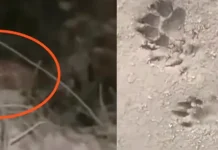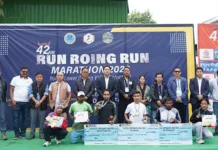NEW DELHI, 30 Dec: Nagaland will continue to be a ‘disturbed area’ for another six months under the AFSPA as the condition of the state remained “dangerous,” a move which comes amid growing clamour for withdrawal of the special powers to the armed forces, especially after the death of 14 civilians earlier this month in a case of mistaken identity.
In a notification issued on Thursday, the ministry of home affairs said that the disturbed area under the Armed Forces (Special Powers) Act or AFSPA was extended for six months from 30 December.
The state has been under the controversial AFSPA since 1958. The Act is an offshoot of the British’ Armed Forces Special Ordinance of 1942.
The extension comes three days after the Centre constituted a high-level committee under the chairmanship of Registrar General Vivek Joshi, with Union Home Ministry Additional Secretary Piyush Goyal as its member secretary.
The chief secretary and the director general of police of Nagaland and the director general of the Assam Rifles are among the other members of the committee.
The committee is supposed to submit its report within 45 days.
Thursday’s notification said the Centre “is of the opinion that the area comprising the whole of the state of Nagaland is in such a disturbed and dangerous condition that the use of armed forces in aid of the civil power is necessary.
“Now, therefore, in exercise of the powers conferred by Section 3 of the Armed Forces (Special Powers) Act, 1958 (No 28 of 1958) the central government hereby declares that whole of the state of Nagaland to be ‘disturbed area’ for a period of six months with effect from 30 December, 2021, for the purpose of the said Act,” the home ministry notification issued by Goyal, the member secretary in the high-level panel, said.
People in Nagaland have been demanding withdrawal of the AFSPA and it gained momentum after the army killed six civilians, mistaking them as insurgents on 3 December and later on bumped off eight villagers in Mon district of the state as the villagers went on a rampage and killed one soldier in anger.
The anger among the people pushed the Nagaland government to call a special session on 20 December, when the assembly unanimously resolved to demand the repeal of the AFSPA.
It said that the House “appreciated and supported” citizens and civil society organizations over their demand for the repeal of the AFSPA and delivery of justice, and appealed to “all sections to follow democratic norms and non-violence in the collective endeavour towards realization of peace and delivery of justice.”
The AFSPA empowers security forces to conduct operations and arrest anyone without any prior warrant, besides giving immunity from arrest and prosecution to the security forces if they shoot someone dead.
Orgs denounce AFSPA extension
The Centre’s decision to extend the stringent Armed Forces (Special Powers) Act or AFSPA by another six months has raised the hackles of prominent Naga outfits, which said the measure was “unacceptable” and made with the intention to “suppress Nagas for generations to come.”
“Government of India has ignored the wishes of the Naga People. All Naga people have been pleading with the GoI and constantly pressing for repeal of the Act. Naga people don’t accept it. We will go to any extent to press the GoI to repeal the Act,” said K Elu Ndang, general secretary of Naga Hoho, an influential body of Naga tribes in Assam, Arunachal Pradesh, Manipur and Nagaland.
He wondered why the AFSPA was extended despite peace prevailing in the state.
“As long as the army is empowered to shoot and kill innocent people, there cannot be a peaceful environment in our land,” he said, and alleged that the armed forces and not the common people or Naga political groups were creating law and order problems in the state.
Eastern Nagaland People’s Organization president R Tsapikiu Sangtam said the outfit has called a meeting on 7 January to discuss the extension of the AFSPA.
Convenor of the Global Naga Forum, Chuba Ozukum, a former president of the Naga Students’ Federation, said protests against the law have been like “shouting in the wilderness.”
He said the Naga political issue would not have lingered for so long had the Centre been serious about resolving it, and claimed that the killing of civilians earlier this month in Oting in Mon district by security forces was aimed at “breaking the ceasefire” but it did not succeed.
Now, their (GoI’s) intention is not to settle the political problem. They want to suppress our people for generations to come, he alleged.
Ozukum claimed that the AFSPA has been extended to “undermine the rights” of the Nagas.
Naga Mothers’ Association advisor Prof Rosemary Dzuvichu lamented the extension, saying it should not have happened amid protests by civilians and the ongoing investigation into the killings in Mon district. She insisted that the extension of the AFSPA was avoidable.
“The measure amounts to challenging the Nagas,” she said.
“We are shocked because this is an insult, especially to the grieving mothers, women and to all of us who have suffered under the AFSPA for generations. We are the third generation to be reeling under the Act. It’s time for Nagas to rethink our position with regard to the GoI,” she said.
The AFSPA empowers security forces to conduct operations and arrest anyone without a warrant. It also gives certain immunities to the forces if they shoot someone dead.
No senior state government official was immediately available for comments. (PTI)


